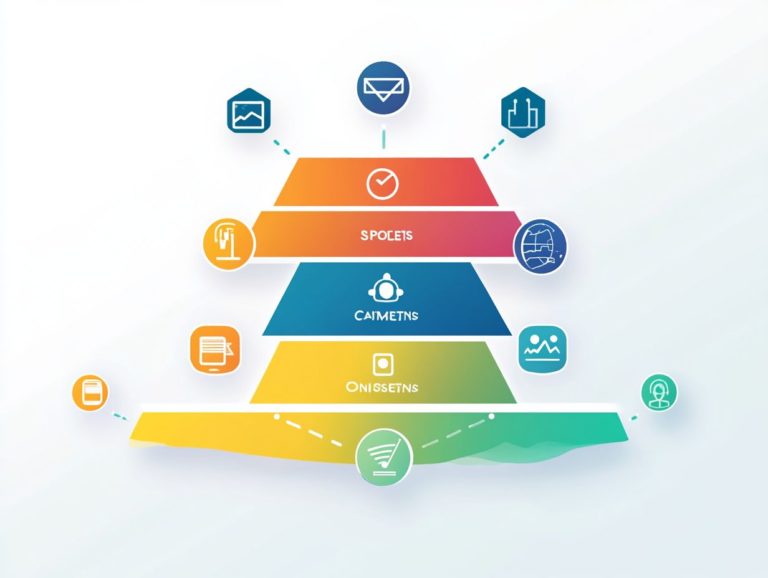How to Evaluate CRM Software Options
In today’s fast-paced business environment, understanding Customer Relationship Management (CRM) software is crucial for building strong relationships with customers and driving sustainable growth.
This guide delves into the fundamental purpose of CRM systems and highlights essential factors to consider when evaluating your options. You ll explore key features, integration capabilities, costs, and user experience to ensure a well-rounded understanding.
Discover the various types of CRM software available, the steps to assess your specific needs, and how to make a decision that aligns seamlessly with your business objectives. Whether you re a small startup or a well-established enterprise, this guide equips you to confidently navigate the CRM landscape.
Contents
- Key Takeaways:
- Understanding CRM Software
- Factors to Consider When Evaluating CRM Software
- Types of CRM Software
- Steps to Evaluate CRM Software
- Making the Final Decision
- Frequently Asked Questions
- 1. What factors should I consider when evaluating CRM software options?
- 2. How can I identify which CRM features are most important for my company?
- 3. What should I look for in terms of security when evaluating CRM software options?
- 4. How can I compare pricing plans between different CRM software options?
- 5. Is it important for CRM software to integrate with other tools and systems?
- 6. How can I ensure a smooth transition when switching to a new CRM software?
Key Takeaways:

Consider your business needs and goals before evaluating CRM software options. Research and compare features, integration, cost, user experience, and industry-specific options. Additionally, look into strategies for CRM system evaluation, request demos and free trials, and consider feedback and reviews to make an informed decision on the best CRM software for your business.
Understanding CRM Software
Understanding CRM software is crucial for business leaders aiming to elevate performance, streamline operations, and boost profits.
CRM, or Customer Relationship Management, solutions are essential for managing customer interactions, enhancing communication, and harnessing key metrics to fine-tune business strategies.
By leveraging CRM software, you can gain deeper insights into your customers’ needs, optimize your sales tools, and implement automation features that simplify day-to-day tasks.
Ensuring robust data security builds trust in your customer relationships and keeps you compliant with industry standards.
What is CRM Software and its Purpose?
CRM software is crafted to assist you in managing interactions with current and potential customers, ultimately enhancing your customer service and driving sales growth.
By streamlining communication and providing a centralized database for client information, these tools significantly enhance lead management processes. This capability nurtures leads through personalized communication and timely follow-ups.
The automation features of CRM systems empower you to efficiently schedule appointments and track progress, reducing your manual workload.
With integrated quality analytics, you can gain valuable insights into customer behaviors and preferences, enabling you to tailor your strategies with precision.
In essence, CRM software serves as a comprehensive solution that not only cultivates client relationships but also underpins long-term business success.
Factors to Consider When Evaluating CRM Software
When evaluating CRM software, it’s essential to consider a range of factors that directly influence your business’s operational efficiency and growth potential, including how to evaluate CRM software vendors.
Pay attention to critical metrics, explore various pricing models, and assess the level of technical support available. These elements shape your experience and success with the software.
Key Features and Capabilities
The key features and capabilities of CRM solutions are vital for enhancing business efficiency. They enable effective automation of workflows, streamline scheduling, and improve sales tools.
These functionalities save time and lower the likelihood of human error. For instance, with automation features, you can effortlessly manage routine tasks like emailing clients or following up on leads, allowing your teams to concentrate on high-priority activities.
The scheduling capabilities ensure that appointments and deadlines are managed smoothly, preventing conflicts and facilitating better interactions with clients. Imagine your sales team tracking and prioritizing leads based on predefined criteria, enhancing lead management and driving conversions.
Additionally, leveraging cloud-based CRM platforms boosts mobility, allowing you to access crucial information on-the-go. This fosters responsive communication and well-considered choices, ensuring you’re always one step ahead.
Don’t let outdated systems hold you back. Discover the right CRM software to transform your business today!
Integration and Compatibility
Integration and compatibility are key when choosing CRM software. They determine how well the solution works with your current systems and tools.
When your CRM software integrates smoothly with other applications, it enhances data security and streamlines workflows. Your teams can access important information quickly.
This integration automates processes, eliminating repetitive tasks and boosting productivity. Robust technical support is crucial, providing the expertise needed to resolve any compatibility issues that may arise.
With a reliable support system, you can embrace new technologies confidently, free from concerns about potential disruptions.
Cost and Budget

When selecting CRM software, grasping the pricing model and evaluating the total cost is crucial for aligning with your business budget and anticipated ROI. This is important given the variety of pricing structures available today.
Many solutions offer subscription-based models, allowing you to pay a recurring fee monthly or annually providing predictable expenses and flexibility. One-time costs for outright purchases may seem attractive, but can lead to higher long-term expenses due to the need for updates or modifications.
Carefully evaluating these options is important. The pricing model you choose can affect your cash flow and overall profitability.
User Experience and Support
User experience is crucial for CRM effectiveness. If the interface is easy to use, your team will train quicker and manage data better.
When the interface is intuitive and engaging, your team is more likely to invest time in mastering its features, leading to better data management and informed decisions.
Seamless navigation boosts confidence, allowing you to embrace the technology easily. Additionally, having robust technical support and responsive customer service is essential for resolving any challenges during adoption.
These elements ensure you can quickly address issues and fully leverage your CRM s capabilities, ultimately resulting in a higher return on investment.
Types of CRM Software
The market offers various CRM software options, from cloud-based to on-premise solutions, each tailored to different business needs, and understanding the key factors for selecting CRM add-ons can help you make the best choice.
Cloud-based vs On-premise
Cloud-based software provides flexibility for rapid growth without high upfront costs. On the other hand, on-premise systems give you better control over sensitive data, particularly with strict regulatory requirements.
When considering cost-effectiveness, weigh the initial investment of an on-premise system against the ongoing subscription fees tied to cloud solutions.
Ultimately, the decision between these two CRM software types can profoundly impact your operational efficiencies and strategic decision-making.
Steps to Evaluate CRM Software
When evaluating CRM software, you should adopt a systematic approach.
Start by identifying your specific business needs. Then, conduct thorough research on available options. Compare features and pricing to ensure you re getting the best fit for your organization.
Don t forget to request demos or free trials. These steps will help you make informed decisions that align with your goals.
Identify Your Business Needs

Identifying your business needs is the crucial first step in evaluating CRM software. It lays the groundwork for selecting a solution that aligns with your operational goals and helps you understand how to implement CRM software successfully.
To accurately assess these needs, consider various factors, including the nature of customer interactions, sales processes, and any required automation features.
For instance, understanding how customers engage with your business can unveil service gaps or opportunities for enhancement.
A detailed review of your existing sales processes will help you pinpoint the CRM functionalities that can boost efficiency.
Automation features help you handle repetitive tasks automatically, saving you time. This allows your team to concentrate on fostering relationships.
Ultimately, ensuring that the CRM you choose aligns seamlessly with your specific business objectives enhances productivity, propels growth, and elevates customer satisfaction.
Research and Compare Options
Researching and comparing CRM solutions is crucial for making sure the software fits your business needs, especially when you want to know how to get started with CRM software.
A thorough analysis can dramatically enhance your organization s efficiency. The right CRM can streamline customer interactions and elevate your sales tracking.
Begin by outlining the specific features that are critical to your business needs, such as:
- Contact management
- Reporting capabilities
- Integration options with existing tools
Take the time to explore various pricing models, whether subscription-based or one-time fees, to identify a solution that suits your budget.
Dive into user reviews and feedback to gather insights into real-world applications and customer satisfaction. This thorough approach will guide your decision-making process and help you sidestep common pitfalls.
Request Demos and Free Trials
Requesting demos and free trials of CRM software gives you valuable insights into the usability and functionality of various systems before making a financial commitment.
These hands-on experiences allow you to explore the software’s interface, assess its automation capabilities, and see how well it aligns with your operational needs.
By engaging with the product directly, you can evaluate the technical features and how intuitive the system is for your team members.
This approach presents an opportunity to pinpoint any potential hurdles or limitations that may emerge in real-world scenarios, giving you the ability to make more informed choices tailored specifically to your unique processes and customer interactions.
Consider Feedback and Reviews
Feedback and reviews from other users are crucial when evaluating CRM software, as they provide valuable insights into real-world experiences and popular CRM software options available in the market.
User testimonials reveal perspectives on software performance, like ease of use and response times during support inquiries.
Evaluating specific user-valued features helps identify functionalities that boost productivity.
This understanding not only aids in selecting the right CRM but also highlights areas for improvement.
Leveraging these insights empowers you to prioritize your investments for operational success.
Making the Final Decision
Choosing the right CRM software requires careful evaluation of key factors, including how to evaluate CRM software providers, that affect your operations.
Take your time to weigh your options and find the best fit for your needs.
Factors to Weigh in Your Decision
Evaluate several key factors when considering CRM software, including integration, data security, and the overall business performance impact.
Strong integration systems ensure your business applications work seamlessly, making information sharing easier.
Data security is crucial. Protecting sensitive customer information builds and maintains trust.
A solid reputation in data protection fosters customer loyalty. By focusing on these factors, you can implement CRM solutions that enhance efficiency and improve customer experience.
Frequently Asked Questions

1. What factors should I consider when evaluating CRM software options?
Consider your company’s specific needs, budget, scalability, user-friendliness, integration capabilities, and customer support.
2. How can I identify which CRM features are most important for my company?
Assess your current business processes and identify areas needing improvement. Then, consider features that can address those challenges and align with your goals.
3. What should I look for in terms of security when evaluating CRM software options?
Key security features include data encryption, user access controls, and regular backups. Make sure the software complies with relevant data protection regulations.
4. How can I compare pricing plans between different CRM software options?
Create a list of must-have features and request quotes from various providers. Inquire about any additional fees or hidden costs.
5. Is it important for CRM software to integrate with other tools and systems?
Yes, integration capabilities are crucial. They allow seamless data flow between your CRM and other tools like email marketing and e-commerce platforms.
6. How can I ensure a smooth transition when switching to a new CRM software?
Involve stakeholders in the decision-making process and provide thorough training for employees. Have a detailed data migration plan ready.






